Share
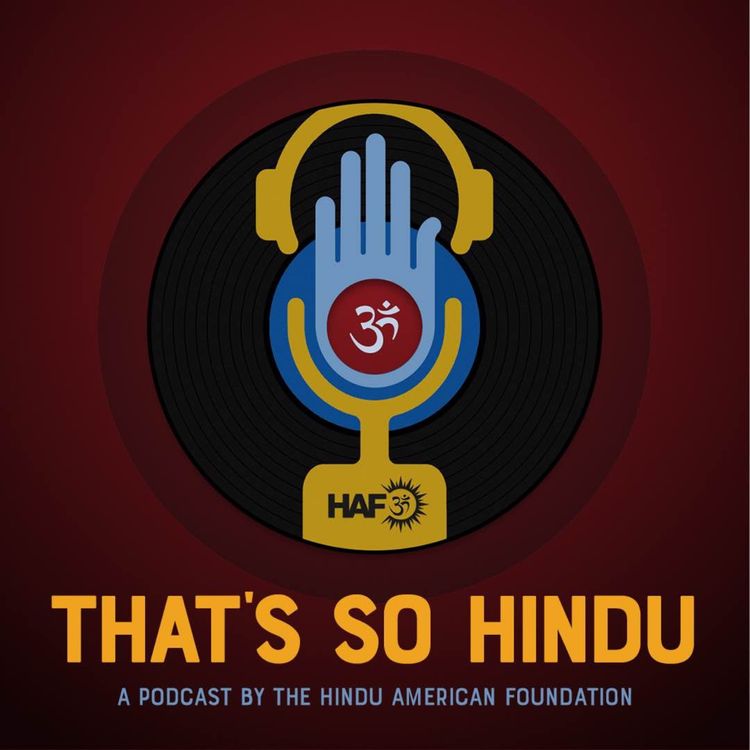
That's So Hindu
Wrongly accused of caste discrimination by California, Sundar Iyer tells us what really happened
Ep. 99
•
In this must-listen episode, Samir Kalra speaks with Sundar Iyer, one of the Cisco employees wrongly accused of caste discrimination by California's Civil Rights Department. Sundar gives us the background of what really happened on his team that led to the lawsuit, what the CRD chose to overlook that didn't support its case, and how it all upended his life, before the case was dismissed against him.
More episodes
View all episodes
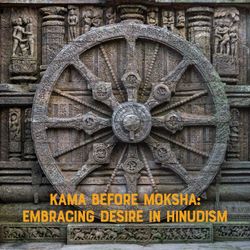
155. Kama Before Moksha: Embracing Desire in Hinduism | Vijay Satnarine & Kavita Pallod Sekhsaria
46:11||Ep. 155In this episode of That’s So Hindu, Mat McDermott speaks with Dr Vijay Satnarine and Dr Kavita Pallod Sekhsaria about the often downplayed and misunderstood concept of kama in Hinduism, emphasizing the importance of desire and pleasure in achieving a balanced life. The discussion critiques the puritanical mindset that has historically downplayed these aspects, particularly in the context of modern relationships and provides insights into the psychological implications of desire, the historical context of sexuality in Hinduism, and practical steps for embracing a holistic view of intimacy and pleasure.TakeawaysKama is a crucial aspect of a balanced life.Desire should not be rejected in the pursuit of moksha.The Victorian mindset has negatively influenced views on sexuality.Intimacy and pleasure are essential for fulfilling relationships.Hindu teachings advocate for a holistic understanding of desire.Communication about sex is vital in modern relationships.Historical texts show a more accepting view of sexuality.Pleasure should be pursued ethically and consensually.Understanding one's desires can lead to personal growth.The conversation around sexuality needs to be normalized.Chapters00:00 Introduction to Kama Before Moksha02:46 Reclaiming Desire: The Balance of Life Goals05:58 Understanding Kama: Beyond the Sutras08:40 The Puritanical Mindset: Historical Context11:47 The Spectrum of Sexuality in Hinduism14:58 The Role of Pleasure in Relationships17:46 Navigating Modern Relationships and Intimacy20:50 Experimentation and Mastery in Relationships23:34 The Impact of Victorian Ideals on Hindu Thought26:38 Addressing Swami Scandals and Human Fallibility29:38 Practical Steps for Embracing Desire32:45 Conclusion: Embracing a Holistic View of DesireKeywordsHinduism, Kama, Moksha, relationships, desire, intimacy, Victorian mindset, sexuality, spirituality, balance
154. The Ethics of Evangelism: A Hindu and Christian Perspective | Fred Stella & John Morehead
01:02:17||Ep. 154In this episode of Thats So Hindu, Mat McDermott speaks with Fred Stella (HAF) and John Morehead (Foundation for Religious Diplomacy). The conversation explores the complex dynamics of Christian-Hindu relations, focusing on proselytization efforts in India and the reactions from the Hindu community. They discuss the ethical boundaries of evangelism, the importance of understanding different religious perspectives, and the need for interfaith dialogue that respects both beliefs. They emphasize the significance of educating young Hindus about their own faith to better engage in discussions with Christians and navigate the challenges posed by missionary activities.TakeawaysChristian evangelism often overlooks the perspectives of those being evangelized.Hindus feel their spiritual identity is often treated as a problem needing a solution.Interfaith dialogue can foster understanding and respect between different faiths.Ethical evangelism should avoid coercion and respect individual beliefs.Education is crucial for Hindus to articulate their beliefs in interfaith discussions.Not all Christians share the same approach to evangelism; there are diverse perspectives.The Great Commission is a fundamental aspect of evangelical Christianity.Interfaith discussions should focus on storytelling rather than debate.Creating alliances with other faiths can help address anti-Hindu sentiment.Respectful dialogue can lead to greater understanding and cooperation among religions.Chapters00:00Setting the Stage for Christian-Hindu Relations05:59Understanding Hindu Perspectives on Proselytization16:49Navigating Differences in Evangelism and Understanding18:21The Nature of Evangelization23:44Understanding the Great Commission24:17Exploring New Perspectives on Other Religions27:14Sharing Spiritual Beliefs Ethically33:28Experiences of Unethical Evangelism39:03Ethics of Evangelism in Interfaith Contexts45:16Finding Common Ground in Diverse BeliefsKeywordsChristianity, Hinduism, proselytization, interfaith dialogue, evangelism, ethical boundaries, cultural relations, religious identity, Great Commission, spiritual beliefs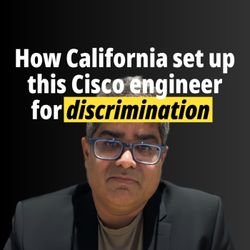
153. Castegate: Inside the documentary about the Cisco caste discrimination case | Ravi Rajan & Sundar Iyer
48:39||Ep. 153In this episode of That’s So Hindu, Mat McDermott interviews Ravi Rajan, producer of the documentary “Castegate” and Sundar Iyer, one of the engineers at the center of Cisco caste discrimination case. The conversation delves into the allegations of caste discrimination, the subsequent documentary that was produced to document the events, and the broader implications of caste discrimination in the US. The speakers discuss the egregious claims made by the California Civil Rights Department, the political mobilization against Hindu Americans, and the legislative context surrounding SB 403. They emphasize the need for community awareness and action against discrimination, while also highlighting the importance of ethical leadership in politics.Watch: https://castegatethefilm.org/ TakeawaysThe Cisco case involves allegations of caste discrimination and harassment.The documentary aims to document the truth behind the Cisco case.There are significant misrepresentations in the claims made by the California Civil Rights Department.Political mobilization against Hindu Americans is a growing concern.Caste discrimination is being used as a tool to target Hindu Americans.The Civil Rights Department's actions raise ethical questions about government agencies.SB 403 was introduced to address caste discrimination but has controversial implications.Community reception of the documentary has been positive, with awards received.Calls for donations are crucial to support the ongoing efforts related to the film.The fight against discrimination is a collective responsibility for all Americans.Chapters00:00Overview of the Cisco Case02:56The Film's Development and Purpose05:57Behind the Scenes: Documenting the Truth08:39Egregious Claims and Misrepresentation11:42Speculation on Broader Agendas14:45Caste and Identity: A Complex Discussion17:31Statistical Misuse and Its Implications20:52Community Reception and Future Plans23:34Reflections on Pushback and Advocacy28:31Ethical Responsibilities of Leaders31:25Legal Challenges and Civil Rights34:44Caste Discrimination and Legal Implications37:47Racial Dynamics and Social Commentary39:57Cultural Shifts and Societal Reactions43:53Examining Harassment Claims46:31The Allegations of Isolation47:34The Possibility of a Setup49:30Coincidences and Causation50:56Understanding SB 40353:45The Implications of Caste Legislation56:35Political Ethics and Accountability58:40The Broader Campaign Against Hindu Americans01:03:54Calls to Action and Community SupportKeywordsCisco case, caste discrimination, documentary, civil rights, SB 403, Hindu American community, political mobilization, legal implications, anti-Hindu sentiment
152. Will AI ever get Hinduism right?? | Pawan Deshpande & Devala Rees
53:50||Ep. 152In this episode of That’s So Hindu, Mat McDermott, Pawan Deshpande, and Devala Rees discuss the intersection of AI and Hinduism, exploring how AI can be integrated into devotional practices, the biases present in AI systems, and the implications of misinformation in educational contexts. They delve into the philosophical questions surrounding consciousness and AI, and the potential future of AI in relation to Hindu traditions. The discussion emphasizes the importance of accurate representation and the opportunities AI presents for spreading knowledge about Hinduism.TakeawaysAI images can be used in Hindu practices but with caution.Hinduism encompasses over 300 distinct traditions.Misinformation in educational materials about Hinduism is prevalent.Caste is often misrepresented in AI outputs.AI can mimic human-like features but lacks true consciousness.The optimization function in AI influences its responses.AI performs better when users interact positively with it.Hindus are significant users of AI technologies like ChatGPT.AI presents opportunities for accurate representation of Hinduism.The future of AI in Hinduism raises important philosophical questions.Chapters00:00Introduction to the Guests and Their Backgrounds02:54AI in Hindu Devotional Practices05:49Understanding AI: Definitions and Implications11:59Bias and Misinformation in AI17:52Educational Challenges and Misrepresentation of Hinduism23:44The Role of AI in Cultural Representation29:45Consciousness and AI: A Philosophical Exploration35:57The Future of AI and Hinduism41:45Conclusion and Final ThoughtsKeywordsAI, Hinduism, Devotional Practices, Misinformation, Bias, Education, Cultural Representation, Consciousness, Philosophy, Technology
151. What a Hinduism reporter wants you to know about journalism today | Richa Karmarkar
41:00||Ep. 151In this episode, Mat McDermott interviews Richa Karmarkar, a Hinduism reporter at Religion News Service, discussing the complexities of reporting on Hinduism in America. They explore the perceptions of Hinduism in media, political biases, and the challenges faced by journalists in accurately representing the Hindu community. Richa shares her background, the importance of nuanced reporting, and the need for greater understanding of Hindu identity and immigration issues. The conversation also touches on key stories from the past year and looks ahead to future topics in Hinduism.Follow: Religion News Service | Richa KarmarkarTakeawaysRicha Karmarkar's journey from a Midwestern upbringing to becoming a Hinduism reporter.The complexity of Hinduism makes it challenging to report accurately.Political bias in media often affects the portrayal of Hinduism.Hindu identity is often linked to Indian politics in media narratives.There is a perception of left-wing bias in journalism.Many journalists lack a deep understanding of Hinduism.Community engagement is crucial for accurate representation.Immigration issues are a significant concern for the Hindu community.Support for political figures can vary widely within the Hindu community.The future of Hinduism in America will involve addressing spirituality and community needs.KeywordsHinduism, media representation, political bias, immigration, Hindu identity, journalism, Richa Karmarkar, Religion News Service, community engagement, cultural understandingChapters00:00 Introduction and Context of Current Events02:39 Richa's Background and Journey in Journalism04:35 Perceptions of Hinduism in Media Reporting07:55 Political Bias and Representation of Hindus10:30 Navigating Hindu Identity and Media Criticism12:31 Left-Wing Bias in Journalism17:32 Understanding Hinduism in Religion Reporting20:23 Balancing Nuance and Reader Understanding23:05 Key Stories in Hindu Community Reporting24:38 The Evolving Narrative of Immigration and Identity29:53 Community Perspectives on Immigration and Solidarity33:53 The Future of Hinduism in America38:51 Engaging with Hinduism Beyond the Mainstream
150. Hindu parenting tips, tricks & reflections from the Hindu American Foundation team
53:50||Ep. 150In this conversation, moderated by Mat McDermott, HAF’s Samir Kalra, Dr Kavita Pallod Sekhsaria, Sheetal Shah, and Suhag Shukla discuss the complexities of parenting within the Hindu American context. They share personal experiences on how to celebrate both Hindu and mainstream American holidays, strategies for navigating interfaith celebrations, addressing the challenges of educating children about different religions, and the impact of social media on parenting. The discussion emphasizes the importance of being good role models and fostering a strong cultural identity in children.TakeawaysCelebrating both Hindu and American holidays can enrich children's cultural experiences.Incorporating Hindu traditions into mainstream celebrations helps children feel connected.It's essential to engage in open conversations about different religions with children.Parents should model good behavior and values to instill a strong cultural identity.Educational experiences can vary widely; parents must advocate for accurate representation of Hinduism.Social media presents challenges, but balance and monitoring can help mitigate risks.Food can be a powerful motivator in engaging children with cultural practices.Community involvement and shared experiences enhance children's understanding of their heritage.Interfaith discussions should be approached with sensitivity and openness.Parenting requires constant adaptation to new cultural and technological landscapes.KeywordsHindu parenting, cultural celebrations, interfaith, education, social media, Hindu representation, parenting tips, holiday traditions, family values, community engagement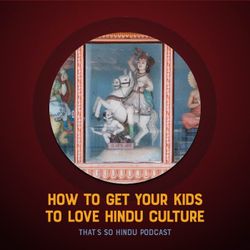
149. How to get your kids to love Hindu culture
31:31||Ep. 149In this episode Mat McDermott speaks with Professor Pankaj Jain. Pankaj has been on the show before speaking about his area of professional expertise, Hinduism, Jainism and ecology. But today we’re speaking about something he’s become particularly passionate about: parenting. Specifically how Hindu parents can help their children develop a love of Hindu and Indian culture.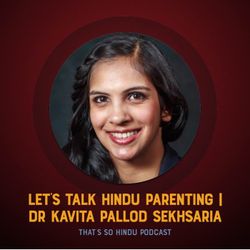
148. Let's talk about Hindu parenting, with Dr Kavita Pallod Sekhsaria
47:10||Ep. 148In this episode HAF Board Member psychologist Dr Kavita Pallod Sekhsaria and HAF Executive Director Suhag Shukla have a wide ranging discussion about parenting as Hindus, the book Bad Therapy, how we can raise resilient children, the differences in parenting across the generations, and more.This show was originally published on September 5, 2024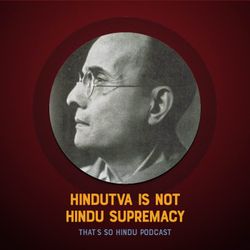
147. Hindutva is not Hindu supremacy | Vikram Sampath
41:10||Ep. 147In this episode Suhag Shukla speaks with historian Vikram Sampath (author of the two volume definitive biography of Vinayak Damodar Savarkar) about the origins of Hindutva and misunderstandings about, its relevance for Hindus living outside of India, and more.This show originally was published on September 26, 2024.